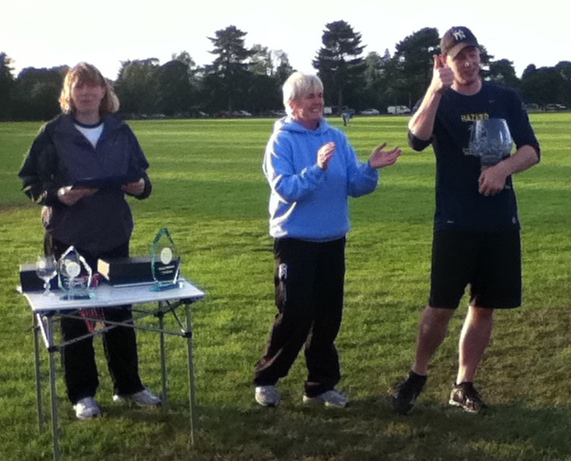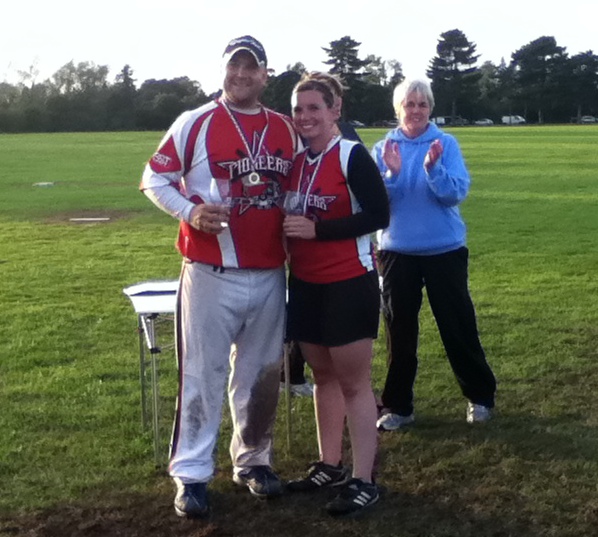 by Bob Fromer
by Bob Fromer
It was the Chromies who were undefeated going into the final of the BSF's 2011 Co-ed Slowpitch Premier Nationals, held at Farnham Park near Slough on the weekend of September 3-4.
It was the Chromies and H2O, the perennial bridesmaids, who were most people's favourites to meet in the final.
After all, H2O had waltzed to the National Softball League title this year, while Chromies had won the Diamond Series. Pioneers had finished third in the NSL and sixth in the Diamond Series, and had allowed the Chromies to catch them from behind at the European Slowpitch Cup in August. The word "inconsistent" was coined to describe the Pioneers in 2011.
And after going undefeated at the Premier Nationals on Saturday, it was the Pioneers who came out and played really badly for a game and a half on Sunday morning, losing 15-3 to H2O and 12-8 to the Chromies. Towards the end of the H2O game, some of the Pioneers' players seemed to have thrown in the towel.
Those two losses meant that the Pioneers finished third in the round-robin standings and would have to fight their way through three games in the Page Playoff to win the title, just as they did in 2010.
So of course the Pioneers did just that. They disposed of Blue Steel 12-4 in the Page Playoff 3 v 4 game, destroyed the hopes of H2O yet again by 13-3 in the semi-final and then rolled over the Chromies 17-9 in the final.
Pioneers' stalwart Michael Lee was asked afterwards if he could have foreseen that.
"Chromies, H2O and Pioneers -- we're all pretty even," Michael said. "It's who gets on a roll. It was tough after we lost those two games in the morning, but we didn't make many errors in the last three games, and that made the difference."
And Pie was absolutely right. The Chromies reached the final without losing a game, mainly because they played terrific defense all weekend. But they were the team that cracked when the title was on the line.
Chromies committed eight errors in the final and two of them -- errant throws to home by Danny Gunn and Brett Gibbens with runners on second and third -- gave the Pioneers four huge runs they would not otherwise have had.
By contrast, the Pioneers committed only two errors, both in the sixth inning when the Chromies looked like they might claw their way back into a one-sided game. But having closed the gap to four runs with an inning to play, Chromies promptly gave the Pioneers four more runs in the top of the seventh, three of them unearned, and that was that.
Photo gallery courtesy of Brian Connolly
Setting the scene
The Premier National Championship features the top eight teams from the 13-team National Softball League, played over five tournaments during the season.
At the Nationals, the eight teams play a full round-robin, followed by a Page Playoff for the top four in the round-robin standings and placing games for the bottom four to determine places 5-8.
So the first objective for the eight teams was to get into one of the top four places by the time the round-robin finished at mid-day on Sunday.
Here are the eight teams that competed, in the order in which they finished in the NSL standings:
H2O
Chromies
Pioneers
Dragons
Mariners
Slammers
Blue Steel
Marvels
Like the football Premier League, there is a small group of teams in the NSL that have usually been at or near the top while the rest struggle for places behind them. For Man United, Chelsea and Arsenal (or Man City if you must), read Chromies, H2O and Pioneers.
But this year saw some inroads into the established order. New team Blue Steel finished second in the Diamond Series. Mariners were in the top three in the NSL standings for much of the season before subsiding to fifth. Marvels beat everyone at some point in the season except H2O. And Baker Tomkins, who have played in every A-grade or Premier Nationals since time began, didn't even make the cut this year.
All of which suggested that the 2011 Premier Nationals might be an open tournament, full of surprises.
Well, it wasn't.
Round-robin results
By the end of the first day, it was clear that Chromies and Pioneers (both 5-0) and H2O (4-1 after an unexpected loss to the occasionally dangerous Slammers) were going to finish in the top three places. Upsets were going to be thin on the ground.
In fact, Slammers' win over H2O was the only loss by a top three team to any of the other five teams throughout the tournament.
Mariners did hold Pioneers to a 6-3 scoreline and the Dragons only lost 3-0 to Pioneers and came very close to beating the Chromies.
A 5-5 tie in the bottom of the seventh inning was only broken when a mishit ground ball down the first base line by the Chromies' Milada Zolobova refused to roll foul and Milada reached to load the bases with two outs. Dragons' pitcher Mark Saunders then walked Paul Gough on a 3-2 count for the walkoff winning run.
But otherwise, most games between the top three and the other five were routine wins for the top three.
Why the reversion to type?
One reason is that the stronger teams sometimes struggle to get all their players out during the regular season, but they usually manage to turn up for the Nationals.
But the most important reason is that Chromies, Pioneers and H2O have stronger players throughout their line-ups than anyone else, and they can turn it on when they need to. Just as in the football Premier League, there is a gap between the top teams and the rest.
So the only real question over the course of the round-robin was: who would finish fourth?
It wasn't going to be either Mariners or Marvels, both winless at the end of Day 1.
Instead, fourth place was going to be a battle between Dragons, Slammers and Blue Steel, all of whom finished Day 1 with a 2-3 record.
But both Slammers and Blue Steel had played the top three teams already in compiling their 2-3 results, while Dragons still had to face H2O on Sunday. So it looked like a final round-robin game between Slammers and Blue Steel on Sunday, scheduled to be played just before the playoffs began, might be decisive.
Sunday morning
That's how things turned out, because Dragons beat Marvels but lost 22-2 to H2O on Sunday morning and Slammers beat Marvels 10-2.
But Blue Steel almost blew it.
Their job on Sunday morning was to beat the Mariners. But Blue Steel was behind 13-0 after two innings. Back they came, and eight runs in the top of the fifth brought them to within a run at 13-14. But Mariners promptly scored five in the bottom of the fifth. Blue Steel were rallying in the top of the sixth when the heavens opened and everyone scuttled for clubhouse, cars and trees during a 45-minute delay. When the game resumed, so did Blue Steel and took a 20-19 lead. Up came Mariners for their last at-bat. They tied the game and had the winning run on second when Blue Steel managed to grab the third out.
The draw meant that the Blue Steel-Slammers game was still on as the fourth-place decider. The game was played on a pitch where the rain had turned the right-hand batter's box to mud, and it took three innings for Slammers to persuade the umpire to shift the pitch to avoid this. Before then, several batters had slipped coming out of the box, and one of those slips allowed Blue Steel to complete a double play that aborted a Slammers' rally.
But Blue Steel were building up a lead, and a three-run homer by Nate Sumpter in the top of the fourth gave them an 8-0 advantage. Slammers cut the lead in half in the bottom of the fifth when Chris Yoxall hit a three-run blast, but Blue Steel were up 11-5 when Slammers came to bat in the bottom of the seventh. Slammers went for it, and cut the lead to 11-9, but that was as far as they could get.
Blue Steel, in their first year of existence, had made the Page Playoffs at the Premier Nationals.
Round-robin standings
The final round-robin standings were:
1 - Chromies (7-0)
2 - H2O (5-2)
3 - Pioneers (5-2)
4 - Blue Steel (3-3-1)
5 - Dragons (3-4)
6 - Slammers (3-4)
7 - Mariners (0-5-2)
8 - Marvels (0-6-1)
Page Playoffs
Blue Steel may have made the Page Playoffs, and may even have fancied their chances in the 3 v 4 game against a Pioneers team that had just lost 15-3 to H2O (a three-run blast by Steve Hazard in the first inning and a bunch of Pioneers' errors) and 12-8 to Chromies (two home runs by Brett Gibbons and more Pioneers' errors).
But Pioneers held Blue Steel scoreless in the top of the first, then put up eight runs in the bottom of the inning, and the kind of comeback Blue Steel had staged against the Mariners was never going to happen. Pioneers won 12-4.
Meanwhile, the 1 v 2 game between Chromies and H2O was a low-scoring affair, with Chromies leading 5-4 after six innings when "no new inning" was called. H2O felt that they had just beaten the clock and had earned a seventh inning, but it didn't happen.
So Chromies were through to the final, and H2O, initially convinced that this would be their year after so many near-misses, now had the Pioneers to beat before they could join the Chromies in the title game.
Pioneers came out with guns blazing and scored five runs in the first inning, four of them on a bases-loaded home run by Mike Povolones, who hit for the cycle in this game (single, double, triple and home run), with six RBIs.
Then the defenses took over and by the end of the fourth inning, Pioneers were only up 6-2 and well within reach. But in the top of the fifth, Mike Povolones struck again, this time with a two-run triple, and suddenly it was 10-2 and H2O, who had 11 fly ball outs in the game, seemed to have accepted the inevitable.
Pioneers tacked on two more runs in the top of the seventh, thanks in part to Mike Povolones' double, and the final score in the game that destroyed H2O's quest for another year was 13-3.
"We just didn't hit," said H2O outfielder Brian Connolly after the game. "It's as simple as that. They beat us fair and square."
The final
Chromies Manager Dougie Clouston was uncharacteristically lost for words when this game ended. "You saw it," he said. "What can I say?"
It was a simple tale. One team had 23 hits, scored in six of the seven innings and -- apart from one inning -- played good defense and had excellent pitching that kept the opposition hitting fly balls instead of line drives (though most of the line drives were caught as well).
The other team did none of those things for most of the game, finishing with just nine hits (six in one inning) and those eight big errors.
The successful team, of course, was Pioneers. It's not that they buried Chromies from the start, but they just kept scoring. It was 2-1 after the first inning, 4-1 after the second and 8-2 after the fifth.
Laura Brockman's two-RBI single accounted for the Pioneers' runs in the first, but the two they scored in the second set a tone for the game. Pioneers had runners on second and third with one out when leadoff hitter Nate Goodman popped out to Chromies' second baseman Danny Gunn in short right field. Mike Povolones, the Pioneer runner on third, tagged up and made a fake towards home. Danny could have run the ball in and frozen the runners, but instead he made an off-balance throw that skidded past catcher Clare Butler and two runs were home.
At 8-2 to Pioneers after five innings, the game certainly wasn't out of reach for a Chromies team that can often be explosive. But the sixth inning settled the game.
Pioneers scored five times in the top of the sixth on five hits and three Chromies' errors, and the errors were paramount. It started when Steve Rice's sinking line drive to right-centre was midjudged for a two-base error. Vanessa Goodman singled to left-centre, with Steve stopping at third. Nate Goodman's double to right-centre drove in Steve, but Vanessa would have stopped at third if a good throw had come back to the infield. But Brett Gibbens tried to fire the ball all the way home, again the throw skidded past Clare Butler and Vanessa and Nate both scored. By the time the inning ended, Pioneers were up 13-2.
Chromies being Chromies, they were never going to go entirely quietly, and in the bottom of the sixth inning they had a shot at getting back in the game.
It took the form of a seven-run uprising on six hits and two Pioneer errors, as the Pioneers' defense wobbled a bit under the pressure.
Pioneer pitcher Dan Spinks walked his Chromies counterpart Pat Hoey to start the inning -- never a good idea -- and then Natalie Bailey and Mike Cameron singled, Moe Flett reached on an error and Brett Gibbens hit a vicious line drive double to right-centre. A groundout and flyout seemed to have dampened the rally, but singles from Michaela Sulcova and Paul Gough, another error and a two-RBI single by Pat Hoey accounted for the seven runs.
Suddenly Chromies were only trailing 13-9, with one more at-bat to come. But it was imperative that they hold Pioneers in the top of the seventh.
That didn't happen. Pinch-hitters Michael Lee and Kelly Page led off with singles, but after a fielder's choice and a sacrifice fly by Liz Keaveney, Pioneers had only scored once and there were two outs. Dan Spinks singled to right-centre to put runners on first and third, but Chromies had the third out in their grasp. Laura Brockman bounced back to Pat Hoey. A routine play. A flip to Marketa Sulcova at first and the inning was over. But Pat's toss was low, Marketa couldn't gather it, a run scored and the Chromies were staring into Mount Doom.
Robbie Robison and Sandra Lewis stroked run-scoring singles and then there was the final indignity when Mike Povolones' pop-up fell untouched between third base player Moe Flett and pitcher Pat Hoey.
That made the score 17-9, and though Mike Cameron doubled to lead off the bottom of the seventh inning for the Chromies, the next three batters went quietly, including Brett Gibbens, who didn't bother to run out his bouncer to short.
Pioneers savoured their second straight National Championship and their chance to gain revenge on the Chromies in next year's European Slowpitch Cup, since both teams will be back -- Chromies as defending champions and Pioneers as national champions.
MVPs for the final were Vanessa Goodman and Dan Spinks from Pioneers.
In the placing games, Dragons beat Slammers 9-7 to finish fifth, and Mariners beat Marvels 14-12 to finish seventh.
Premier Nationals Final Standings
1 - Pioneers
2 - Chromies
3 - H2O
4 - Blue Steel
5 - Dragons
6 - Slammers
7 - Mariners
8 - Marvels
Premier Nationals Notes
Run it out! The practice of players not bothering to run out hits when they think it's an obvious out seems to be an increasing phenomenon in A-grade slowpitch, and it's not a good one. Some of the very best players are the worst offenders, as if even bothering on a crap hit is beneath them, but it's not how the game should be played, as any decent coach will tell you. The extreme version of this occurred on Sunday at the Premier Nationals when a female batter hit an easy pop-up to a good male second base player and instead of heading to first, turned in disgust and started back to the bench. By the time she realised the second base player had dropped the ball, she had crossed the dead ball line and couldn't even try to get to first.
Home advantage. In setting up the schedule for this tournament, BSF Tournaments Officers Liz Graham and Lesley Morisetti decided that in every round-robin game, the team with the higher ranking in the NSL standings would be the home team. So the top teams were at home in almost every game and lower-ranked teams were almost always the away team. Some players thought this might be overkill, since home teams have a considerable tactical advantage and beating the top teams is hard enough as it is!
Dress sense. A couple of years ago, a gentle criticism of the Pioneers for having dull white shirts at the National Championships didn't endear me to them. So I'm happy to report that the Pioneers now have far and away the best shirts of any of the Premier Nationals teams, including two flags on the back of each shirt -- one a GB flag, the other the flag of the player's country of birth. The most colourful is Robbie Robison's Zimbabwe flag.
A posse of umpires. Possibly for the first time ever in this country, BASU assigned a six-umpire crew to work the final -- one umpire at each base and one down the left field and right field foul lines. It was impressive -- but it still didn't prevent a major controversy on a fair/foul decision down the right field line, probably because the line marking stopped about 100 feet short of the fence!


